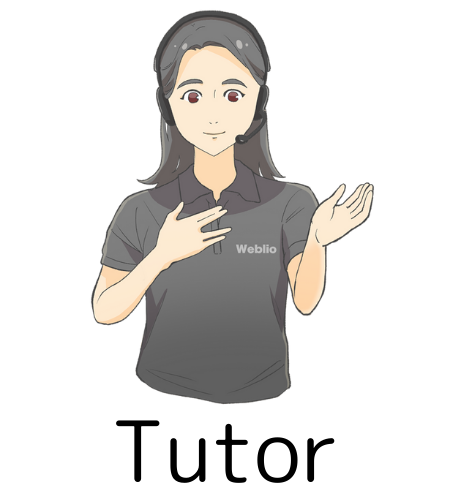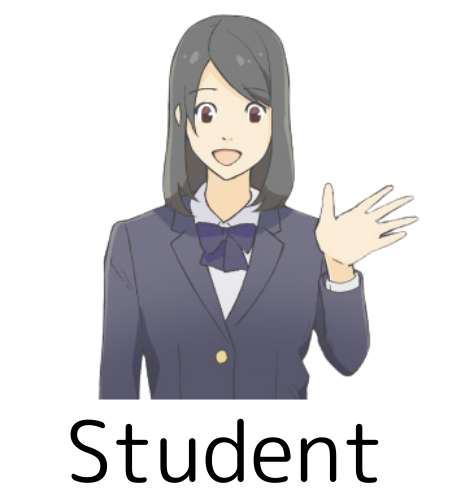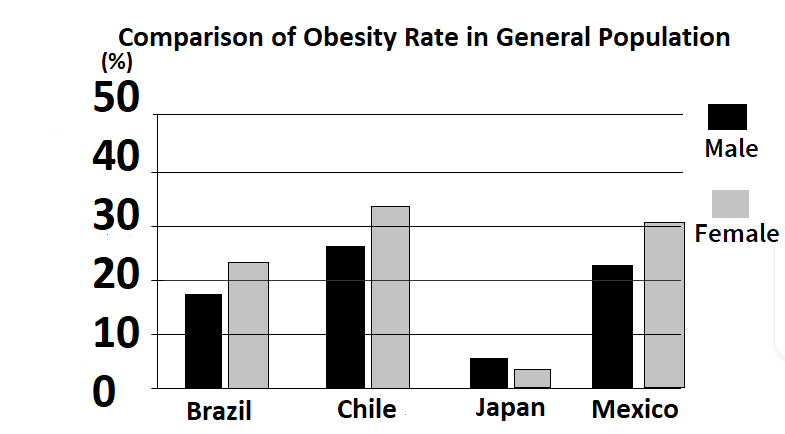Part A Introduction

TUTORS NOTE
– OPEN the tutor guide URL in the Pinned message.
– Follow the instructions in the tutor guide.
– Follow the instructions in the tutor guide.

Part A_1 Introduction
Let’s introduce ourselves to each other.
自己紹介をしましょう。
My name is ________. What is your name?
Part A_2 Introduction
I am ________. Nice to meet you.


Part A_3 Introduction
Nice to meet you too, ________. Which do you prefer, sweet drinks or non-sweet drinks? Why? When do you feel like drinking each type of drink?
Part A_4 Introduction
| Answer: |


Part A_5 Introduction
________________________________. Let’s begin our lesson!
Part B Listening 1

TUTORS NOTE
– OPEN the tutor guide URL in the Pinned message.
– Follow the instructions from [PART B_1] to [PART B_7] in the tutor guide
– Follow the instructions from [PART B_1] to [PART B_7] in the tutor guide

Part B_1 Listening 1
Please listen carefully while I read the passages.
Then, choose the letter that matches the content.
Then, choose the letter that matches the content.
講師がパッセージを一度読み上げます。そのあと内容に合う文章を次のa~dから選びましょう。最後に答え合わせをします。

TUTORS NOTE
– Tutors MUST read the passage in the tutor guide in [PART B_2]
– The tutor guide URL is in the pinned message
– The tutor guide URL is in the pinned message

Part B_2 Listening 1
| a. | The U.S. has succeeded in reducing the number of obesity among children through its own measures. |
| b. | Some Latin American countries placed a 20 percent tax on junk food and sugary drinks. |
| c. | Obesity continues to be a serious problem in the U.S. and other developed countries, especially among adults. |
| d. | Some Latin American countries have their own measures to reduce obesity, and some of them seem to be working. |
Part B_3 Listening 1
| Answer: |


Part B_4 Listening 1
Please listen carefully while I read the short passage once. Then, choose the letter of the correct answer.
パッセージの続きを一度だけ読みます。そのあと内容に合う文章を次のa~dから選びましょう。

TUTORS NOTE
– Tutors MUST read the passage in the tutor guide in [PART B_5]
– The tutor guide URL is in the pinned message
– The tutor guide URL is in the pinned message

Part B_5 Listening 1

| a. | In Brazil, less than 10% of females are extremely overweight. |
| b. | Japan’s school lunch system could be one reason for the low obesity rate. |
| c. | Chile has the lowest rate of obesity in all of Latin America. |
| d. | Mexico’s obesity rate among males has decreased as a result of the junk food tax. |
Part B_6 Listening 1
| Answer: |


Part B_7 Listening 1
Now, let’s review your answers.
では、あなたの答えを復習してみましょう。

TUTORS NOTE
– Tutors MUST read the instructions in the tutor guide in [PART B_7]
– The tutor guide URL is in the pinned message
– The tutor guide URL is in the pinned message
Part B_8 Listening 1

Part C Listening 2

TUTORS NOTE
– OPEN the tutor guide URL in the Pinned message.
– Follow the instructions from [PART C_1] to [PART C_7] in the tutor guide
– Follow the instructions from [PART C_1] to [PART C_7] in the tutor guide

Part C_1 Listening 2
Please read the situation below. Then, please listen carefully while I read the dialogue.
After that, please answer the following questions.
After that, please answer the following questions.
下記の状況を読んでください。その後講師が会話文を音読するので、質問に答えましょう。
Part C_2 Listening 2
Luke and Miyu are talking about vegetarianism and balanced diets.


TUTORS NOTE
– Tutors MUST read the dialogue in the tutor guide in [PART C_3]
– The tutor guide URL is in the pinned message
– The tutor guide URL is in the pinned message

Part C_3 Listening 2
1. What is Luke’s main point?
| a. | Vegetarianism requires attention to nutritional balance. |
| b. | Vegetarianism has not been very common recently in France. |
| c. | Vegetarianism is a diet that focuses on eating a lot of meat. |
| d. | Vegetarianism is a diet high in vitamins and it may lead to disease. |
Part C_4 Listening 2
| Answer: |


Part C_5 Listening 2
2. What does Miyu insist on?
| a. | Eating some fries and cheesecake to get some vitamins. |
| b. | Being careful not to spend much money on meat. |
| c. | Giving up eating meat to get healthy and avoid diseases. |
| d. | Being careful to get balanced nutrients by eating breakfast. |
Part C_6 Listening 2
| Answer: |


Part C_7 Listening 2
Now, let’s review your answers.
では、あなたの答えを復習してみましょう。

TUTORS NOTE
– Tutors MUST read the instructions in the tutor guide in [PART C_7]
– The tutor guide URL is in the pinned message
– The tutor guide URL is in the pinned message
Part C_8 Listening 2

Part D Vocabulary

Part D_1 Vocabulary
We will read aloud the words below. Please repeat after me. I will check your pronunciation.
単語を音読します。講師に続いて読みましょう。講師は発音を確認します。
Part D_2 Vocabulary
| 1. | extinction |
|
絶滅
|
|
| 2. | mother tongue |
|
母語
|
|
| 3. | threat |
|
脅威
|
|
| 4. | neighbor |
|
近所の、隣り合うもの
|
|
| 5. | multilingualism |
|
多言語主義
|


Part D_3 Vocabulary
Now, let’s review some words from part E_2.
ではいくつかの単語、文章を復習してみましょう。
Part D_4 Vocabulary

Part E Reading

Part E_1 Reading
Please read aloud the whole passage below. I will check your pronunciation and intonation.
以下の文章を声に出して読んでみましょう。講師が発音、イントネーションについて確認します。
(Please send the mispronounced words and phrases to your student.)
Part E_2 Reading
Languages become extinct
There are around 6,000 languages that are still spoken today, and at least half of them could go extinct. In fact, Professor Steve Sutherland of the University of East Anglia says that languages are more in danger of extinction than animals like birds and mammals.
According to Joseph Poth, head of UNESCO’s languages department, we should all speak our mother tongue, a “neighbor” language, and an international language. He also says that even teaching a language that is under serious threat in schools creates a rescue system.
For languages with few remaining speakers, it might already be too late. These speakers are typically elderly, rarely use their native tongue, and have lost many of the words they once knew. But at last, the importance of these languages is finally being recognized, and multilingualism may be one of the keys to their survival.


Part E_3 Reading
Now, let’s review some words and sentences from part F_2.
ではいくつかの単語、文章を復習してみましょう。
Part E_4 Reading

Part F Reading

Part F_1 Reading
I will ask the following questions. Please answer questions 1 to 2 based on the passage, and 3 based on your opinion.
講師が3つ質問をします。1~2はパッセージの内容に基づいて、3はあなたの意見を伺います。

Part F_2 Reading
| 1. | Based on the passage, how many languages could go extinct? |
Part F_3 Reading
| Answer: |


Part F_4 Reading
| 2. | According to Joseph Poth, what three types of languages should we speak? |
Part F_5 Reading
| Answer: |


Part F_6 Reading
| 3. | Losing a language also means losing the culture of the people who speak it. How would you feel if the Japanese language and your unique culture were lost? |
Part F_7 Reading
| Answer: |


Part F_8 Reading
Now, let’s review your answers.
では、あなたの答えを復習してみましょう。
Part F_9 Reading

Part G Making sentences

Part G_1 Making sentences
Please construct sentences using each word below.
以下の言葉を使って文章を作りましょう。
Part G_2 Making sentences
| mother tongue | |
| neighbor |


Part G_3 Making sentences
Now, let’s review your answers.
では、あなたの答えを復習してみましょう。
Part G_4 Making sentences

Part H Making essay

Part H_1 Making essay
Please answer this question:
“Do you think that English should take the place of minor languages?
Answer “yes” or “no” and then explain why you think so.”
“Do you think that English should take the place of minor languages?
Answer “yes” or “no” and then explain why you think so.”
“Do you think that English should take the place of minor languages?”の質問に、なぜそう思うか理由も合わせて答えましょう。
Part H_2 Making essay
“Do you think that English should take the place of minor languages?
Answer “yes” or “no” and then explain why you think so.”
Answer “yes” or “no” and then explain why you think so.”
(Please read aloud your answer.)
答えを読み上げてください。


Part H_3 Making essay
Thank you for your presentation. You did a wonderful job. Now, let’s review your answer.
発表ありがとうございました。では、あなたの答えを復習してみましょう。その後、修正したあなたの答えを読んでみましょう。
Part H_4 Making essay

Part I Review and feedback

Part I_1 Review and feedback
Now, let us review the things that you learned in this lesson.
ではこのレッスンで学んだことを振り返りましょう。
(Please give a short feedback on how your student did on your class.)
| Grammar
文法
|
Pronunciation
発音
|
Vocabulary
単語
|
Comprehension
理解
|
|
|---|---|---|---|---|
 GOOD GOOD |
Was able to speak in complete sentences with minimal grammatical errors.
文法の誤りはほとんどなく、完全な文章で話すことができる |
Was able to pronounce most of the words clearly and correctly.
ほとんどの単語をはっきりと正しく発音することができる |
Used appropriate expressions learned in class.
習った表現を適切に使うことができる |
Was able to understand the passages and answer the questions correctly.
文章を理解し、質問に正しく答えることができる |
 FAIR |
Was able to speak in complete sentences with evident grammatical errors.
文法の誤りはあるが、完全な文章で話すことができる |
Mispronounced a few words.
発音の練習が必要な言葉がいくつかある
|
Used appropriate expressions learned in class and made a few errors in word choice.
たまにミスはあるが、習った表現を適切に使うことができる |
Had a little difficulty in understanding passages and answering questions.
文章を完全に理解するのは難しく、質問に正しく答えられないときもある |
 POOR |
Was able to speak using words only.
文章で話すのは難しく、単語だけで話すことができる |
Mispronounced most of the words.
発音の練習が必要である |
Used only a few words and expressions.
習った単語と表現を少しだけ使うことができる |
Had a hard time understanding passages and answering questions.
文章を理解するのは難しく、質問に答えるのは難しい |
Part J Free talk

Part J_1 Free talk
Let’s do a free talk about the following topics.
フリートークをしましょう。

Part J_2 Free talk
| 1. | Do you like the Japanese language? What do you like about the Japanese language? Do you like English? What do you like about English? What do you think are the good and bad points of each language? |
Part J_3 Free talk
| Answer: |


Part J_4 Free talk
| 2. | In addition to your mother tongue, Japanese, and the international language, English, which language would you learn? Please tell me the reason as well. |
Part J_5 Free talk
| Answer: |
